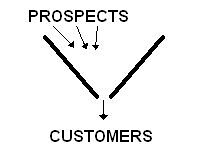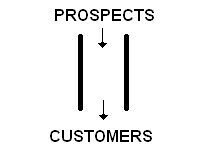Marketing versus Sales
Well, well... I appear to have (proverbially speaking) stirred up a hornet's nest by pointing out that Marketing has been wearing the Emperor's new clothes. I guess I'll have to defend my position.
Let's go. B2B sales are often visualized as a funnel. Prospects go into the top of the funnel and emerge at the end of the funnel as actual customers.
 0" height="159" align="middle" />
0" height="159" align="middle" />
The funnel analogy, however, isn’t accurate, because if you pour water into a funnel, all of the water eventually comes out the bottom. With B2B sales, that’s not the case. Typically only a few prospects that enter the “funnel” emerge as customers; the rest are filtered out. That filtering process costs money because every resource (time, materials, travel, etc.) that a company spends on a prospect that doesn’t eventually become a customer is wasted. And that adds to the cost of sales.
In other words, the difference between the top of the funnel and the bottom is the cost of sales. The bigger the difference, the more it is costing your firm to turn a prospect into a customer.
Many marketing groups wrongly think that their job is to broaden the top of the funnel through demand creation (corporate branding, generic brochures, advertising, etc), in the hopes that a larger number of prospects will enter the funnel, with a corresponding increase in revenue. However, because the sales group is only able to close a finite amount of business, the bottom of the funnel remains the same size. This assumes, of course, that the marketing activity is actually creating demand. In reality, of course, that's not always, or even often, the case.
So, regardless of whether marketing is actually creating demand or only pretending to do so, in most cases the marketing activity merely increases the cost of sales, and therefore diminishes profit. Of course, you could increase the size of the bottom hole by hiring more salespeople, but then all you end up with is a bigger, but still inefficient business model. Which means you're fodder for the first really efficient competitor to enter your market.
The most efficient sales situation (i.e. the one with the lowest cost of sales) would be not a funnel but a flat-edged pipe, so that every prospect that sales touches turns into a customer.

That’s not a realistic expectation, but an ideal to strive for. To approach that goal, sales groups have a responsibility to increase the size of the bottom hole through sales training and skills development. Similarly, the marketing group's primary job SHOULD be to shrink the size of the top hole by ensuring that the prospects entering the pipe are the ones most likely to turn into customers. This decreases the cost of sales, and therefore increases profitability. Insofar as things like market research help achieve this goal, they're useful. But most market research is way too fuzzy-wuzzy to actually do this.
Marketing can also play a role in helping sales to become more effective (thereby increasing the size of the bottom hole) by providing sales training, competitive data, solution-building tools, and so forth. However, those peripheral activities are only useful insofar as they match the requirements of the qualified leads -- the leads that marketing should have been generated. The proof is in the booking, as it were.
In real life, though, most marketing "tools" are simply thrown into the dumper by the sales pros because the "tools" have no relevance whatsoever to actual customers. It's a sad truth that many marketing groups simply generate scads of unqualified leads and piles of useless, generic marketing junk. If you don't believe me, just ask any sales pro.
The way to fix the problem of unfocused, generic marketing activity is to compensate Marketing based upon its ability to reduce the cost of sales. This works because:
- Cost of sales is easily quantifiable and highly visible to top management, which can quickly take action if Marketing falls short.
- Focusing on sales cost prevents Marketing from funding folderol that neither generates qualified leads nor helps Sales close those leads.
Unfortunately, most (not all) marketing groups are compensated based on how many brochures they print, how many ads they run, how many conferences they attend, how many presentations they give, and (let's be honest here) how much C-level butt they can kiss. Or they take credit whenever anybody makes a sale, regardless of whether there was a causal connection between what Marketing did and the actual sale.
Under the circumstances, I'm not at all surprised that some marketing folk react with wounded umbrage and eye-rolling alarm at the very idea that they should compensated based upon something measurable. Who wants to be held accountable when it's so much easier just to hold a focus group in Paris and then bloviate about it in the executive suite?